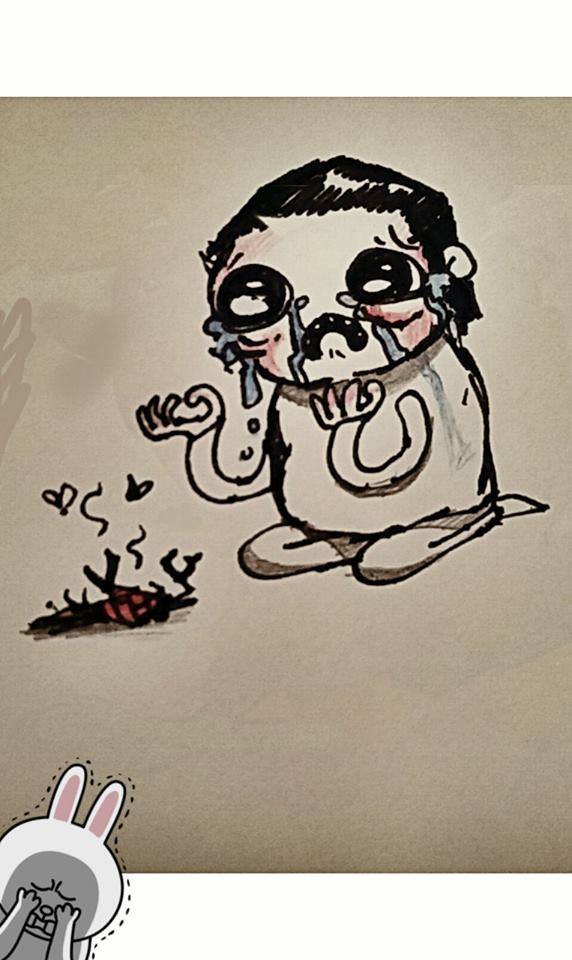
There is a great columnist in Taiwan, Chou Wei-hang, who goes under the nickname 「人渣文本」 (Scum Text), often featured in magazines in Taiwan. Always a column to look out for. I was reading a particularly scathing article (unfortunately no longer available) he wrote ripping into Taiwan’s ruling Democratic Progressive Party (DPP), when I came across this cool pun, which harkens back to one of my previous posts 「無魚,蝦也好」:
何煖軒用有損華航形象為由幹掉一位工會空姐,新潮流覺得這樣做很好嗎?段宜康覺得這樣做很好嗎?鄭文燦覺得這樣做很對嗎?鄭運鵬你也力薦何煖軒啊,要不要評價一下他上任的表現?瑕不掩瑜?蝦不掩魚?又愚又瞎?
Ho Nuan-hsuan fired one of the union air hostesses for damaging China Airlines’ image. Does the New Tide faction (within the DPP) think that he did a good job? Does Tuan Yi-kang (DPP Legislator) think he did a good job? Does Cheng Wen-Tsan (Taoyuan Mayor for DPP) think he did a good job? Cheng Yun-Peng (DPP Legislator), you highly recommended Ho Nuan-hsuan (as chairperson of China Airlines), why don’t you evaluate his performance after taking the job? A small blemish doesn’t spoil jade? Shrimp doesn’t spoil fish? It’s both foolish and blind?
The author takes the common idiom 「瑕不掩瑜?」 (xia2bu4yan3yu2), meaning literally that “one blemish doesn’t spoil the jade” and figuratively that just because there are disadvantages to something, doesn’t mean that they aren’t great overall. He then substitutes the 「瑕」(xia2) meaning “flaw” for 「蝦」(xia1) meaning “shrimp/prawn”, and 「瑜」 (yu2) meaning the “lustre of jade” for “魚” (yu2) meaning “fish”.
Now the phrase reads, “shrimp cannot spoil the fish”, and this is a nod to the Taiwanese phrase 「無魚,蝦也好」 (bô hî, hê mā ho):
Although this phrase was originally used to indicate “Something is better than nothing”, here it is used to mock the idea that you can replace something good with something lesser and still claim to be great overall. Here it particularly refers to the way politicians and others step down from their campaign promises with less appetizing versions of policies. This is a similar usage to the one I pointed out in Li Ang’s novel chronicling the breakdown of idealism and misogyny of the opposition activists that eventually formed the DPP:
陳英俊因一般女性仍不敢靠近,基本上沒有太多的選擇,加上林慧淑頗具吸引力的姿色,很快的確定了兩人的關係。
As no normal women [Lin Hui-shu is the product of a mixed marriage between a mainland soldier and an aboriginal woman] dared to be associated with Chen Ying-jun, he really didn’t have much choice, and as, Lin Hui-shu was really quite attractive, the two quickly entered into a relationship.
雖然偶有政治犯同學戲稱他無魚蝦也好,但多半是羨慕又帶嫉妒。
Although some of his political prisoner comrades joked with him that he was really scraping the bottom of the barrel, most admired him with a little bit of jealousy mixed in.
Riffing again on the “yu2” and “xia1” sounds, he adds the phrase 「又愚又瞎」, where 「愚」 (yu2), meaning “foolish”, is a homophone of 「魚」 (and 「瑜」) and 「瞎」(xia1) is a homophone of 「蝦」 (and a near homophone of 「瑕」xia2).

A Taiwanese saying “魚範魚,蝦範蝦"means:
Apples and oranges
Or “As different as chalk and cheese” ?
Pingback: Many Shrimp: Thanks in Taiwanese! To-siā/多謝/多蝦 | Translating Taiwan